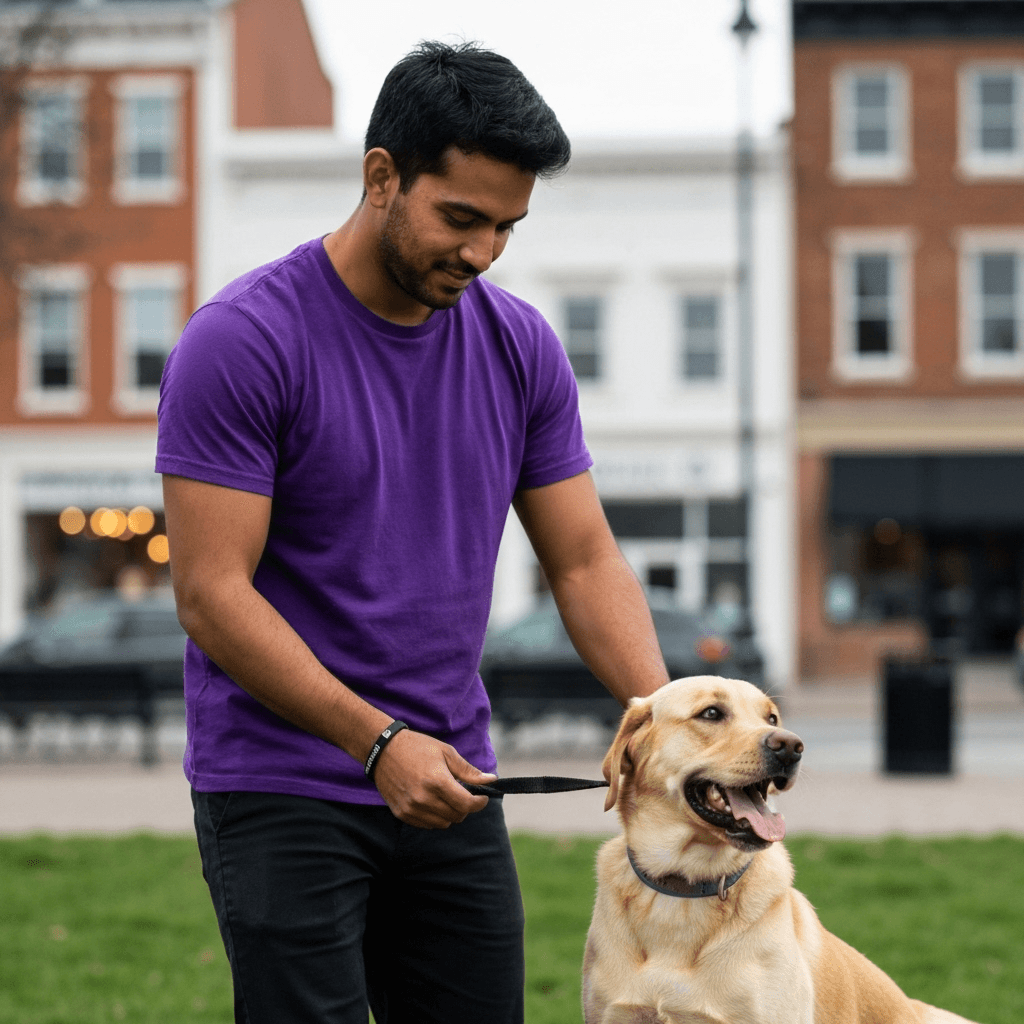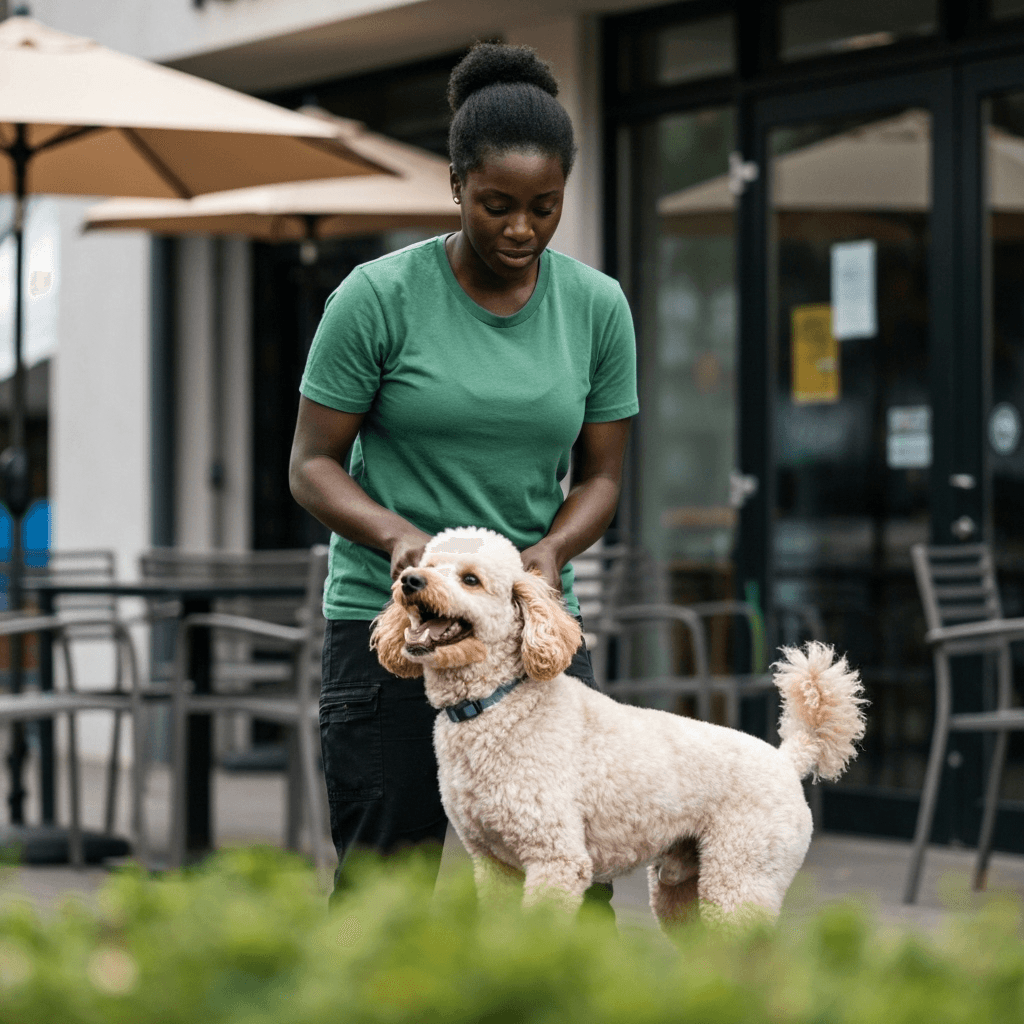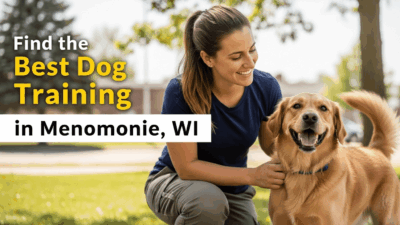Your Complete Guide to Choosing a Dog Trainer in Menomonie
If you’re a dog owner in Menomonie, you know the unique challenges this college town brings. Your pup needs to navigate busy sidewalks when UW-Stout students are rushing to class, stay calm during Applefest crowds on Main Street, and walk politely around the beautiful Lake Menomin trails where joggers, cyclists, and other dogs are always present.
The right dog trainer understands these local realities and can help you build the skills your dog needs to thrive here. Whether you’re dealing with a puppy who’s never seen college students on skateboards or an older dog who gets overwhelmed by the activity around Wakanda Park, finding someone who gets both dog behavior and life in Menomonie makes all the difference.
How to Choose the Right Trainer
When you’re looking for a trainer, start with their methods. Positive reinforcement training builds the kind of trust and reliability you need when your dog encounters everything from farmers market crowds to off-leash dogs at the local dog park.
You want someone who can help your dog learn loose-leash walking for those long strolls on the Red Cedar State Trail, polite greetings when kids run up wanting to pet them, and the ability to settle calmly on restaurant patios downtown. These real-world skills matter more than perfect competition-style obedience.
Credentials give you a way to compare trainers’ backgrounds and expertise. Common dog trainer certifications include KPA-CTP and CPDT-KA. If you’re dealing with more serious behavior issues like fear or aggression, look for advanced credentials like IAABC-CDBC, CBCC-KA, or science-based programs such as CTC.
Think about your specific situation when choosing between training formats. In-home coaching works particularly well for puppies who aren’t fully vaccinated yet, dogs with door manners issues, or reactive dogs who need to practice in their own environment before facing bigger challenges. Group classes are great once your dog can focus around other dogs and give you a chance to practice in a controlled setting before heading to busier places like the farmers market or downtown events.
Many experienced trainers offer a free consultation. This is your chance to see if their approach feels right, ask about their experience with your specific challenges, and get a realistic timeline for the changes you want to see.
Common Dog Training Methods Explained

Understanding different training approaches helps you find someone whose methods match your goals and your dog’s personality. Reward-based methods build the kind of trust and enthusiasm that makes training stick, especially important when your dog needs to make good choices around all the distractions Menomonie offers.
Basic obedience and dog obedience training cover the foundation skills every local dog needs. We’re talking about sit, down, stay, place, reliable recall, and leash manners that let you enjoy restaurant patios, community festivals, and park visits without stress or embarrassment.
Puppy training and puppy classes focus on early socialization during that critical period when your young dog is learning about the world. Good puppy programs include potty training support, crate training for those times you need to run errands on campus, and short, fun sessions that prevent problem behaviors from developing.
Behavior modification becomes necessary when dogs struggle with fear, reactivity to other dogs or strangers, resource guarding, separation anxiety, or other issues that make daily life difficult. This specialized work requires careful desensitization and counterconditioning, often taking several months of consistent practice.
Private lessons and in-home dog training let trainers customize everything to your home environment and neighborhood routines. This works especially well for door manners, yard reactivity, or practicing skills on the specific routes you walk every day.
Group classes provide structure and space for dogs to practice calm behavior around others. They’re perfect preparation for real-world situations like the dog-friendly events that happen throughout the year in Menomonie.
Day training can speed up progress when your work or school schedule makes daily training sessions difficult. The trainer works with your dog during the day, then teaches you how to maintain and build on what they’ve learned.
Board and train programs take your dog for intensive training over several weeks. If you’re considering this option, ask detailed questions about their daily routine, how much owner coaching is included, and their plan for helping your dog transfer those new skills back to your home and neighborhood.
Specialized programs like service dog training or therapy dog training require trainers with specific experience and step-by-step protocols, plus extensive work on public manners and focus around distractions.
Stay away from trainers who rely on intimidation, fear, or pain to change behavior. Besides being unnecessarily harsh, these methods often create more problems and can make dogs unpredictable around the community interactions that are part of life here.
Local Rules and Practical Considerations in Menomonie and Dunn County
Understanding local rules helps you train your dog appropriately and avoid problems with neighbors or authorities. Most regulations are common sense approaches to keeping everyone safe and comfortable in shared spaces.
Leash laws require dogs to be on leash and under control in all public areas unless you’re inside a designated off-leash dog park. A standard 6-foot leash gives you good control on sidewalks and trails without being unwieldy.
Waste cleanup is required everywhere your dog goes, including trails, parks, and neighborhood walks. Keep bags with you at all times and dispose of waste properly.
Noise ordinances can apply to dogs who bark excessively, especially if it’s disrupting neighbors. Building relaxation skills and providing enough mental stimulation helps prevent this from becoming a problem.
Wisconsin state law requires current rabies vaccination and a yearly dog license through your municipality. You’ll need proof of vaccination to get your license, and some activities like dog parks may ask to see vaccination records.
For issues like lost dogs, bite incidents, or questions about local ordinances, contact Dunn County Animal Control. State guidance on rabies requirements and bite protocols comes from Wisconsin DHS.
When it comes to trainers specifically, Wisconsin doesn’t require special licensing for dog training professionals. This makes it even more important to ask about education, experience, and recognized credentials like CPDT or KPA certifications.
Trainers who offer boarding services (like board-and-train programs) may need local kennel permits and must follow state animal care regulations. Responsible trainers carry general liability insurance, and if they use public parks for training sessions, they may need permits and proof of coverage from the city or county.
Average Cost of Dog Training in Menomonie (Updated for 2025)
Training costs in the Menomonie area depend on the trainer’s experience and credentials, session length, travel requirements, and complexity of your goals. Here’s what you can expect to pay locally in 2025:
| Service Type | Average Cost (Menomonie/Dunn County) |
|---|---|
| Puppy classes (4–6 weeks) | $140–$240 total |
| Group obedience classes (4–6 weeks) | $150–$275 total |
| Private lessons (60–90 min) | $95–$160 per session |
| In-home coaching packages (4–6 visits) | $420–$850 total |
| Day training (trainer works your dog + handoff) | $400–$800 per week |
| Initial behavior consult (fear/reactivity/anxiety) | $130–$200 |
| Board and train (2–4 weeks) | $1,600–$3,200 total |
Expect additional travel fees if you live in the more rural parts of Dunn County. Complex behavior modification work typically costs more than basic obedience training.
Before committing to any program, make sure you understand what’s included in the price, how progress will be measured, and what support you’ll get for practicing between sessions. The cheapest option isn’t always the best value if it doesn’t include the follow-up coaching you need to succeed.
Questions to Ask Potential Trainers
These questions help you find someone whose approach and experience match your needs:
- What training methods do you use, and how do you keep sessions positive and low-stress for my dog?
- What credentials do you hold, such as CPDT-KA or KPA-CTP? Do you pursue continuing education like CPDT-KSA?
- How familiar are you with training dogs for life in Menomonie, including challenges like college campus distractions, lake trail etiquette, and downtown events?
- What training formats do you offer (in-home, group classes, day training), and which would work best for my situation?
- How will we measure progress and decide when my dog is ready for bigger challenges?
- What exactly is included in your pricing, and are there additional fees for travel, equipment, or missed appointments?
- Do you carry liability insurance, and can you provide proof?
- For behavior issues, do you work with veterinarians when medical factors might be involved?
- Do you offer a free consultation so we can see if we’re a good fit?
- If you provide board-and-train, how do you help owners maintain progress after their dog comes home, and what ongoing support is included?
Where to Practice Around Menomonie
Having good places to practice makes training more effective and enjoyable for both you and your dog. These local spots offer different levels of distraction as your dog’s skills improve.
The Red Cedar State Trail and connecting sidewalks provide excellent opportunities for real-world leash training. You’ll encounter cyclists, joggers, other dogs, and varying levels of activity depending on the time of day. Check Wisconsin DNR pet rules before visiting state trail areas.
Wakanda Park offers both developed areas with moderate distractions and open fields where you can practice recall on a long line where allowed. The mix of playground activity, sports, and open space lets you gradually increase challenges.
Downtown Menomonie sidewalks near dog-friendly shops and restaurants give you chances to practice polite passing, settling calmly while you chat with neighbors, and ignoring food distractions from outdoor dining areas.
The UW-Stout perimeter sidewalks provide controlled exposure to college-age energy, bikes, skateboards, and intermittent crowds without being overwhelming. This helps prepare dogs for busier campus events and downtown festivals.
Lake Menomin shoreline walks and fishing access points offer beautiful scenery plus the challenge of staying focused around wildlife, water attractions, and the mix of recreational activities that happen along the lake.
Local Resources for Dog Owners
Menomonie’s off-leash dog area (city-operated and fenced) gives you a place to practice recall and work on calm greetings with other dogs. Visit during quieter hours when you’re still building skills, and don’t stay too long if your dog gets overstimulated.
The Dunn County Humane Society provides resources beyond adoption services, including microchip clinics and community education. They’re also a good source for referrals to local trainers and veterinarians.
Several pet supply stores in town welcome leashed dogs, giving you low-pressure opportunities to practice calm behavior around other customers, interesting smells, and the checkout process.
Always check current rules, hours, and any fees before visiting new locations with your dog.

Common Questions About Dog Training
How much does in-home dog training cost?
Most trainers in the Menomonie area charge $95–$160 per in-home session. Package deals usually reduce the per-session cost, and complex behavior work typically falls on the higher end of the range.
Is in-home dog training worth it?
In-home training lets you work on problems where they actually happen, whether that’s door manners when delivery drivers arrive, counter-surfing in your kitchen, or reactivity to dogs passing your yard. You’ll also learn to generalize those skills to sidewalks, parks, and downtown areas.
Can you pay someone to house train your dog?
Many trainers offer puppy programs that include potty training schedules, crate training, and management strategies. Day training can accelerate progress while teaching you how to maintain consistency.
What is the 3-3-3 rule for dog training?
This guideline suggests dogs need about 3 days to decompress in new situations, 3 weeks to start learning routines, and 3 months to feel truly settled. Training programs work better when they respect this natural timeline.
How long will it take to reach my training goals?
Friendly dogs learning basic manners often show good progress in 4–8 weeks with daily practice. Behavior modification for fear, aggressive dog training, or reactivity usually requires several months of careful, consistent work.
What should I bring to group classes?
Bring a flat collar or harness, a standard 6-foot leash (not retractable), high-value treats, water for your dog, and vaccination records if requested. Some trainers provide equipment for the first class while you’re getting started.
What’s the leash law in Menomonie?
Dogs must be leashed and under control in all public areas unless you’re inside a designated off-leash dog park. A standard leash works better than retractable ones for training and safety.
Do I need a dog license in Menomonie or Dunn County?
Yes, Wisconsin requires yearly licensing for dogs over a certain age, and you’ll need current rabies vaccination proof to get your license. Contact your municipality for specific requirements and fees.
What shots does my dog need in Wisconsin?
Rabies vaccination is required by state law. Your veterinarian will recommend additional vaccines based on your dog’s lifestyle and local disease risks. See Wisconsin DHS for current rabies guidance.
Are dog trainers required to be licensed in Wisconsin?
Wisconsin doesn’t require special licensing for dog trainers. Trainers must follow normal business regulations, and any facility that boards dogs must comply with local kennel requirements and state animal care laws.
Where can I practice off-leash recall?
Use fenced, designated off-leash areas or secure private spaces for off-leash practice. In unfenced public areas, practice recall on a long line while keeping your dog leashed as required by local ordinances.
Which dog parks allow training around Menomonie?
The city’s off-leash dog area typically allows recall practice and greeting work with other dogs. Visit during quieter times, follow posted rules, and keep sessions short to prevent your dog from getting overwhelmed.
What trails allow dogs for training?
Dogs on leashes are welcome on most state trails, including the Red Cedar State Trail. Check current pet policies with the Wisconsin DNR before visiting.
Do trainers need insurance to work in parks?
Wisconsin doesn’t mandate specific insurance for trainers, but many parks require permits and liability insurance proof for commercial activities. Ask your trainer how they handle permits and request to see their insurance certificate if needed.
Finding the right trainer and staying consistent with practice will give you a dog who can handle everything Menomonie has to offer, from quiet morning walks around Lake Menomin to busy weekend festivals downtown. Focus on positive reinforcement methods, clear communication, and realistic expectations, and you’ll build the partnership that makes living with your dog in this beautiful area even more enjoyable.
If credentials matter to you, ask potential trainers about their dog trainer certifications and how they stay current through programs like IAABC-CDBC or CTC.
